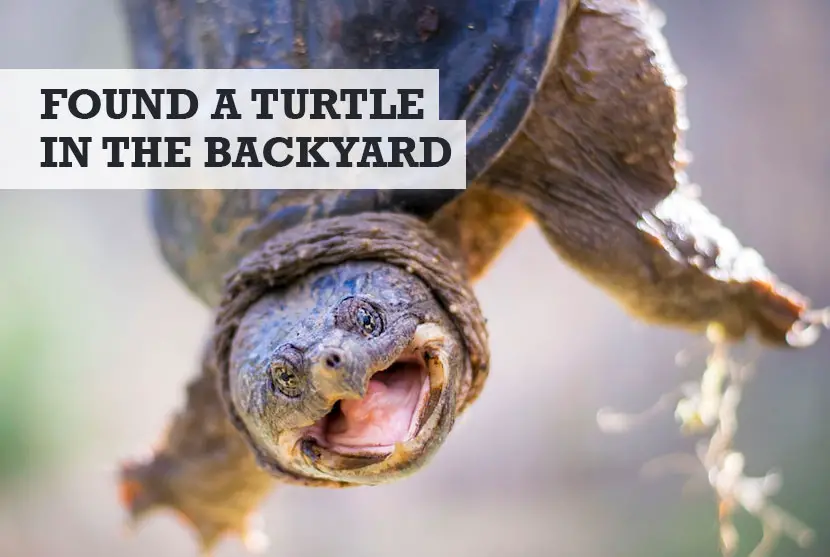After the initial surprise of finding a turtle in your backyard subsides, thoughts might turn to what to do next. This is understandable, as if you don’t have a pond, or own turtles, seeing one on your lawn is enough to worry anyone.
If you want to know what to do with a found turtle in your backyard, here’s the right advice.
What to do when you find a turtle in your backyard?
1. Don’t be scared
So, firstly, let me get some concerns out of the way. Turtles don’t want to hurt you, your kids, or your pets. Even ones with fearsome names like “snapping turtles” will want to ignore you and fear you.
Don’t get into full panic mode, keep calm, and read the next tip on what to do with a lost turtle.
2. Don’t do anything
You really did read that right.
The best advice I can give you when you find a turtle in your backyard is to do nothing and let them get on with it.
It could be that a female turtle is passing through to find somewhere safe to lay her eggs. If that happens to be your yard, then what a privilege. You may get to witness something incredible when they hatch.
It might look like the turtle is heading in a strange direction, but believe me, they usually know where they are going. Turtles have amazing navigational skills.
The bottom line is, don’t move or touch a turtle.
If you do move the turtle out of your yard you risk it becoming ill, become at risk from predators, be unable to find food and shelter, and disturb the ecosystem and the animal’s social structure.
You honestly don’t need to do anything unless you’re worried about the health of the creature. In that is the case, call a wildlife charity or a vet.
3. Don’t take them to water
You might think you’re doing the turtle a favor by picking him up and putting him in your backyard pond. But please don’t.
Whilst it’s very possible that’s where the turtle was heading, it might not be an aquatic species, and placing it in water could lead to it drowning.
What can I feed a turtle I found in my yard?
I do not recommend feeding wild turtles that have lost their way into your yard. Wild turtles have very specific diets depending on their species, so feeding them the wrong thing could do them more harm than good.
However, if you are determined to feed the lost turtle in your yard, or believe it needs feeding, in general, some safe foods can include:
- Worms
- Grasshopper and crickets
- Chopped up apples and pears
- Green leaves such as parsley and lettuce
But even so, I don’t recommend you feed a turtle found in your yard. Instead try to identify what species the turtle is, and its age. That will determine what it eats.
For example, baby turtles you find in your backyard will need more protein than adults do. On the other hand, water-based species like snapping turtles you might find in a backyard pond, need food they would get in an aquatic environment.
For help with any of this, call the ASPCA or your local vet for advice.
Is good luck to find a turtle in your backyard?
I am not the superstitious type, but I do know (and respect) that some people place meaning in certain things. This is down to personal belief, so some might say it’s good luck to find a turtle in the yard.
This is based on turtles tending to live long lives, and how they carry their homes around on their back. Some say finding a turtle can lead to prosperity and tranquillity.
What do you think?
Why you should not relocate turtles?
To re-iterate when I explained what to do when you find a turtle in your backyard, you don’t move or relocate the creature. There are several reasons why.
- The turtle could be on his way to mate, or her way to lay eggs. By moving them from your backyard, you could be putting their future at risk, and upset the ecosystem.
- By relocating a turtle to a new and unfamiliar place, you could expose them to diseases and parasites.
- The turtle is likely just passing through, as they tend to not travel further than 1.5 miles from where they were born. If you relocate them, they will panic and not be able to find their way back.
- Whilst you might not have seen the “lost” turtle in your backyard before, chances are he knows all the hiding places, where to get food, and shelter. Moving him somewhere else means he will likely die.
In conclusion, the turtle in your backyard has probably lived there or near to you for years. You’ve just never seen him or her before.
Yes, there is a slim chance the turtle was dropped by a predator, such as a hawk, but even in cases like this, leave the little guy to make his own way.
More backyard guides…
- How newts manage to find your pond
- How frogs find your backyard pond
- Why you have frogs in your yard but no pond
Turtle image from https://unsplash.com/photos/Fx3q_ceaJoI

